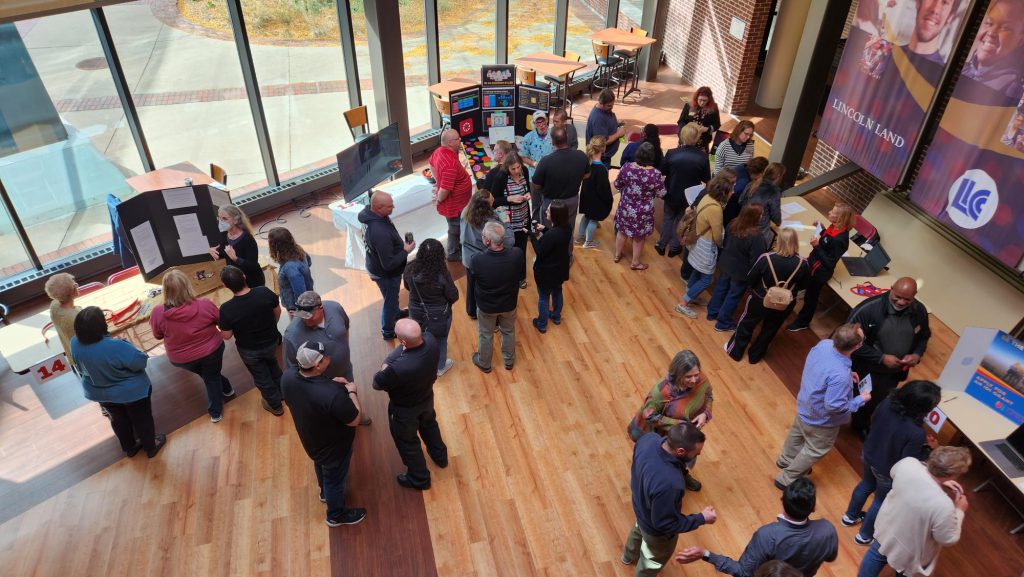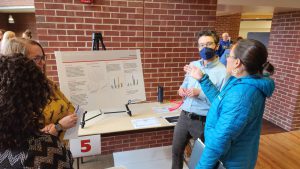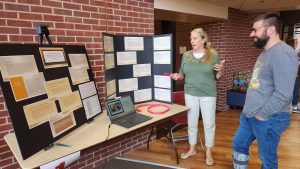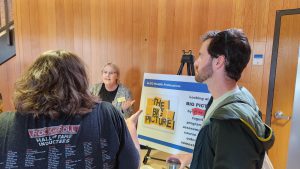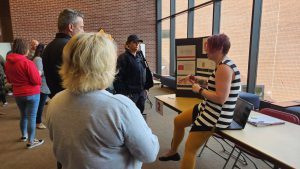There is still time to voice your opinions by participating in the PACE Climate Survey for Community Colleges. The deadline for the PACE survey has been extended to Dec. 2. Some have experienced their PACE survey email invitations landing in junk/spam folders. The emails are coming from <pace_survey@ncsu.edu>. Your participation is important and appreciated!
Category Archives: IRE
Assurance argument review
Congratulations to the final Quizno’s lunch recipients in the assurance argument review!
Josh Collins and Gretchen Conway provided evidence in support of core component 1B. Specifically, both provided specific examples of LLCC faculty/staff collaborating with businesses and organizations in District 526. These actions support subcomponent 1.B.3: The institution engages with its external constituencies and responds to their needs as its mission and capacity allow.
Mary Dellert provided meeting minutes which strengthened our response to subcomponent 2.C.3: The governing board reviews the reasonable and relevant interests of the institution’s internal and external constituencies during its decision-making deliberations.
Friday’s Assessment Fair
Congratulations to the following faculty and staff, whose names were drawn for assessment fair baskets!
Keri Mason, Illinois Basket from Pease’s at BUNN Gourmet
Trenton Eckert, Grill Bundle
Karen Sisk, Pie Filling Basket
Bree McClenning, Detailing Bucket
Debra Bell, Spices/Sauces from BUNN Gourmet
Josh Collins, Route 66 Basket
Tiffany Elliott, LLCC Foundation Basket
Photos from the event:
Zogotech undergoing maintenance tomorrow
Zogotech users — Zogotech server maintenance will be conducted tomorrow, Oct. 11. As a result, Zogotech (zogotech.llcc.edu) will be offline that day. Power BI will remain online but any data that is refreshed daily may be a day behind.
We plan to have Zogotech back online by the following day, Wednesday, Oct. 12, and will send out a notification once it’s back up. This update will not change any part of the Zogotech user interface.
Still time to review and comment for chance to win a free Quiznos lunch!
Congratulations to this week’s Quizno’s lunch recipient — Kalith Smith, dean, social sciences and business! Kalith read and commented on 10 Core Components, suggesting numerous edits and providing additional evidence (e.g., LLCC’s Teacher Education Pipeline) for subcomponent 1.B.3. – the institution engages with its external constituencies and responds to their needs as its mission and capacity allow.
Accreditation is incredibly important, and so is your input! Please make time to read and comment on all or part of the assurance filing (see files emailed yesterday). The deadline has been extended to Sept. 30. The individual who submits the best edit/suggestion for the week will be rewarded with a free Quiznos lunch!
What is the assurance filing? It documents how we are meeting identified criteria (and their subcomponents) to reaffirm our accreditation. The criteria:
- Mission
- Integrity: Ethical and Responsible Conduct
- Teaching and Learning: Quality, Resources and Support
- Teaching and Learning: Evaluation and Improvement
- Institutional Effectiveness, Resources and Planning
We will be hosting a peer review team on campus Dec. 5 and 6. They will be here to confirm the information in our assurance filing — so it is important that it be complete and accurate. It takes all of us working together to have a successful HLC visit!
Student Opinion Survey: Oct 3-12
On Monday, Oct. 3, all LLCC students will receive an email from IRE Automation (IRE.01@llcc.edu) with the subject line HLC Student Opinion Survey. This email communication is not spam but a survey invitation sent on behalf of the Higher Learning Commission (HLC). This survey of students is part of our comprehensive evaluation taking place this fall. Student responses will be shared with the peer review team and may inform questions asked during the site visit on Dec. 5 and 6.
If students inquire about the communication, just reassure them that the email is not spam and their responses are anonymous (unless they self-identify in a comment). For those interested in knowing more, please visit the HLC website. The HLC Student Opinion Survey closes on Oct. 12.
Review, comment and you may get a Quiznos lunch for free!
Accreditation is incredibly important, and so is your input! Please make time to read and comment on all or part of the assurance filing between now and Sept. 26 (see files emailed Sept. 6). The individual who submits the best edit/suggestion for the week will be rewarded with a free Quiznos lunch!
Congratulations to last week’s winners from LLCC Records — Robin Ackman, Shawn Allen and Chase Dilworth. The department identified evidence (seven student transcripts) in support of core component 4.A.2.
What is the assurance filing? It documents how we are meeting identified criteria (and their subcomponents) to reaffirm our accreditation. The criteria:
- Mission
- Integrity: Ethical and Responsible Conduct
- Teaching and Learning: Quality, Resources and Support
- Teaching and Learning: Evaluation and Improvement
- Institutional Effectiveness, Resources and Planning
We will be hosting a peer review team on campus Dec. 5 and 6. They will be here to confirm the information in our assurance filing — so it is important that it be complete and accurate. It takes all of us working together to have a successful HLC visit!
Everyone is a Data Steward. No, Really – We Mean Everyone!
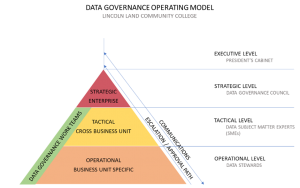 A data steward is someone with formal accountability for data in the organization. In our data governance model, everyone employed by LLCC is considered a data steward. How is this possible? Everyone working at LLCC has a relationship to our data. Since you have a relationship to our data, you are formally accountable for the relationship. Therefore, everyone is a data steward.
A data steward is someone with formal accountability for data in the organization. In our data governance model, everyone employed by LLCC is considered a data steward. How is this possible? Everyone working at LLCC has a relationship to our data. Since you have a relationship to our data, you are formally accountable for the relationship. Therefore, everyone is a data steward.
Operational Layer
LLCC’s data governance operational model categorizes data stewards as one of three types– data definers, data producers and data users. Which roles apply to you?
Data Stewards are:
Data Definers – Define the data that will be used by the organization, how that data will be used, and how that data will be managed
Data Producers – Create, update, delete, retire, archive the data that will be managed
Data Users – Use data to perform job and execute processes; maintain integrity of data usage
- Create, review, approve data definitions
- Maintain the integrity and quality of data definitions
- Produce, create, update, delete, retire, and archive the data in your domain
- Ensure integrity and quality of the data created or updated in your department or process
- Assist your Data Subject Matter Expert (SME) in identifying and classifying data access levels
- Assist your Data Subject Matter Expert (SME) in identifying and documenting regulatory and legal/risk issues, including data retention requirements
- Support and share knowledge with other stewards
- Communicate new and changed business requirements to individuals who may be impacted
- Communicate concerns, issues, and problems with data to the individuals that can influence the needed change
Work on the front line? You have accountability for entering data appropriately and accurately. Creating a new field or value in Colleague? Those defining data have accountability for making certain that they are not redefining (for the umpteenth time) something that has been defined previously. Using a dashboard or report to make an operational decision? You have accountability for how the data is used, knowing the rules that guide use, and knowing that you can review the “data about our data” to improve your understanding of the data and how it can (and cannot) be used.
LLCC employees that define, produce and use data should be held accountable for how they define, produce and use the data. This may sound like common sense to many, but this is not always our reality at LLCC. As a result, the Data Governance Council (DGC) is leading efforts to formalizing data stewardship to ensure that our data is properly governed. We hope that sharing the operational layer chart will begin to shape an understanding of your data governance role(s) and why the DGC considers everyone a data steward.
Why data governance is needed at LLCC
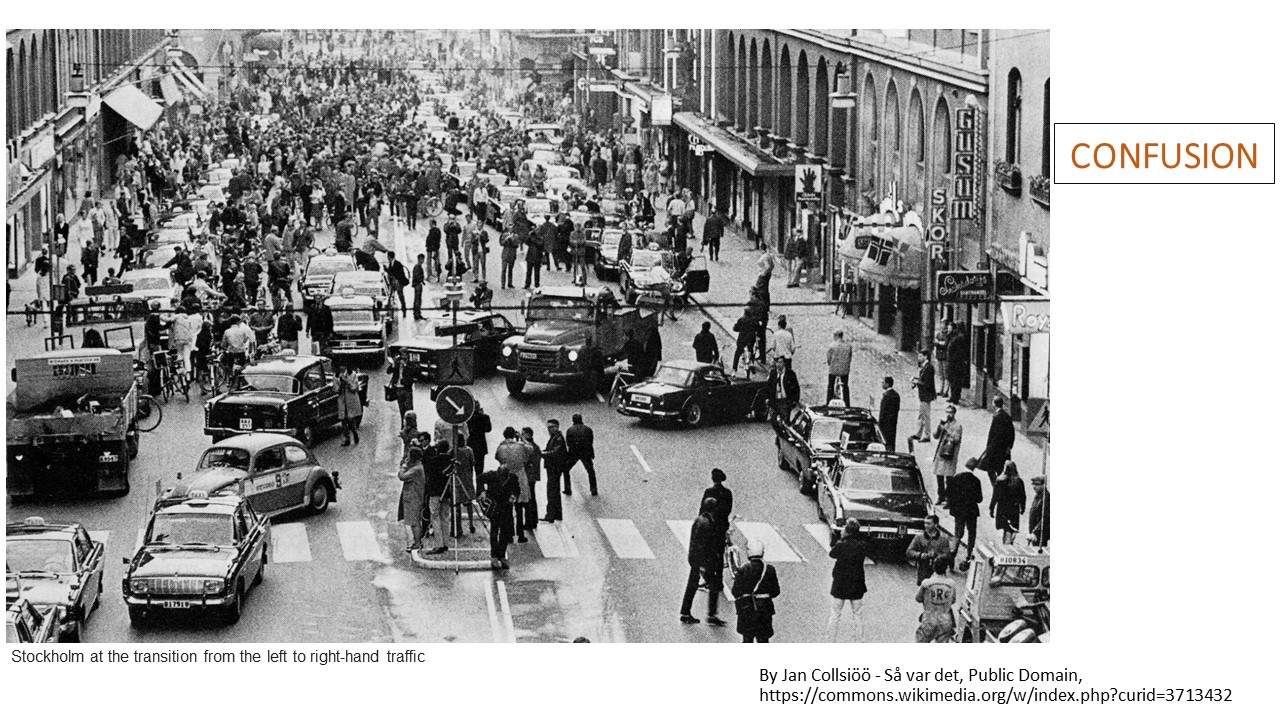 The growth and use of data is analogous to the growth and popularity of the automobile industry. In 1900, there were approximately 8,000 cars and only the wealthy could afford to purchase one. But by 1913, there were over one million gasoline cars being driven in the U.S. alone. Breakdowns were frequent, fuel was difficult to obtain, roads suitable for traveling were scarce and rapid innovation meant that cars quickly became worthless. Rapid growth in the industry bred confusion and management was needed to make driving a car both safe and efficient. Today, rules of the road and the interstate highway system are just givens. Thus, cars are not “just cars.” Cars are roads, maps, maintenance, training, culture, rules, police, gas stations, speed limits, accessories, invisible costs, fun, danger, vehicle standards, emissions, traffic regulations, laws, enforcement, fines … so many things that were not imaginable in the 1800s when the industry was developing.
The growth and use of data is analogous to the growth and popularity of the automobile industry. In 1900, there were approximately 8,000 cars and only the wealthy could afford to purchase one. But by 1913, there were over one million gasoline cars being driven in the U.S. alone. Breakdowns were frequent, fuel was difficult to obtain, roads suitable for traveling were scarce and rapid innovation meant that cars quickly became worthless. Rapid growth in the industry bred confusion and management was needed to make driving a car both safe and efficient. Today, rules of the road and the interstate highway system are just givens. Thus, cars are not “just cars.” Cars are roads, maps, maintenance, training, culture, rules, police, gas stations, speed limits, accessories, invisible costs, fun, danger, vehicle standards, emissions, traffic regulations, laws, enforcement, fines … so many things that were not imaginable in the 1800s when the industry was developing.
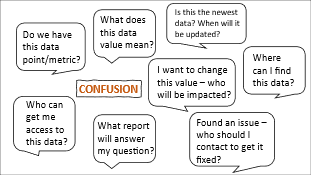 Data is going through a similar explosion of growth, a growth spurred by development of the personal computer. Microsoft Excel was introduced in 1982, and it opened the world to automating repetitive tasks for crunching numbers, process automation and presenting data for businesses. Today we find ourselves immersed in an “analytics for everyone, everywhere” culture. But data are not “just data.” Data are systems, people, processes, IT infrastructure, governance, access, privacy, training, culture, communities of practice, invisible costs, standards, confusion, analysis, interpretation, fun, cool, danger, queries, munging, rules and responsibilities, politics … so many things that were unimaginable 40 years ago. Thus, management of our data is needed, and the Data Governance Council was created to do this for LLCC.
Data is going through a similar explosion of growth, a growth spurred by development of the personal computer. Microsoft Excel was introduced in 1982, and it opened the world to automating repetitive tasks for crunching numbers, process automation and presenting data for businesses. Today we find ourselves immersed in an “analytics for everyone, everywhere” culture. But data are not “just data.” Data are systems, people, processes, IT infrastructure, governance, access, privacy, training, culture, communities of practice, invisible costs, standards, confusion, analysis, interpretation, fun, cool, danger, queries, munging, rules and responsibilities, politics … so many things that were unimaginable 40 years ago. Thus, management of our data is needed, and the Data Governance Council was created to do this for LLCC.
Fall 2021 RISC survey results
If LLCC changed one thing to increase student success, what should be the focus?
In fall 2020, online instruction was the dominant theme. Does this sentiment persist one year later?
Results from the fall 2021 Revealing Institutional Strengths and Challenges (RISC) survey administration are available on the IRE SharePoint. For the second consecutive year, LLCC participated in this national survey to identify campus offices that excel in helping students succeed as well as pinpoint where our students experience obstacles. Please take time to review the documents and learn what our students identify as institutional strengths and challenges.

